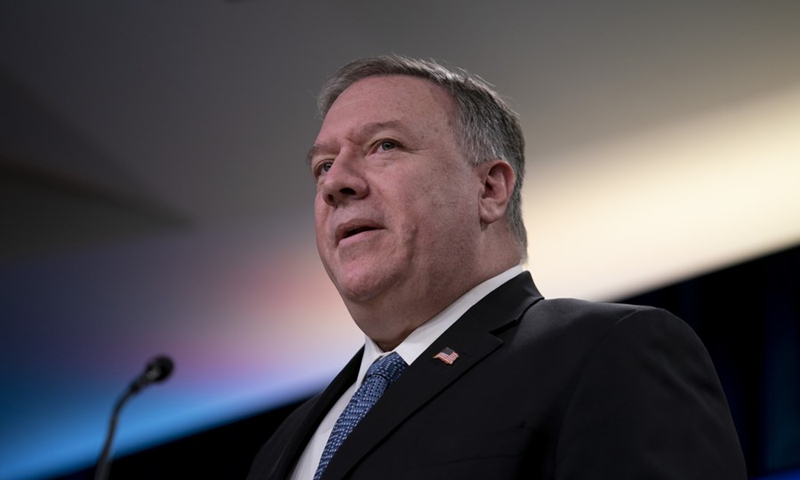
US Secretary of State Mike Pompeo File photo: Xinhua
US Secretary of State Mike Pompeo has finished his anti-China tour in Vietnam and four other nations in South and Southeast Asia on Friday, which analysts described was a fruitless farewell tour.
Despite not mentioning China by name, Pomepo's slick lobby is unlikely to work in Vietnam, despite consciously hyping issues like the South China Sea and Mekong River to create discord.
US media reported that Pompeo visited Hanoi to celebrate 25 years of US-Vietnam ties, but his main aim was to persuade India, Sri Lanka, the Maldives, Indonesia and Vietnam to push back China and bolster its Indo-Pacific vision. However, it seems that nothing substantial has been achieved.
Vietnam media said Pompeo's visit "reaffirms US support for a strong, prosperous, and independent Vietnam" during his talks with Vietnamese Deputy Prime Minister and Foreign Minister Phạm Binh Minh, who later said that Vietnam attaches great importance to its partnership with the US.
The AP said Pompeo's rhetoric in Vietnam, such as "respect for Vietnamese people and your country's sovereignty," is the anti-China code in terms of the South China Sea. Although no explicit mention of China was reported in the high-level meeting between the US and Vietnam, in a statement released on Thursday before Pompeo's tour, the US State Department sowed discord between China and Vietnam on issues like the Mekong River.
While China and Vietnam have some differences over the governance and development of the Mekong River, US provocations won't make it a new battleground between the two countries, Bi Shihong, a professor at the Center for China's Neighbor Diplomacy Studies and School of International Studies of Yunnan University, told the Global Times on Friday.
Some Western media claimed in 2019 that China's hydroelectric dams exacerbated the drought in other countries. In a tweet posted by Pompeo on August 14, he groundlessly slandered China for "manipulating flows in a non-transparent manner."
But the fact is, for 18 years in a row, China has provided free hydrological data on the Lancang River, upstream of Mekong River in China, during the flood season, to assist Mekong River countries' flood control and disaster mitigation plans.
Global experts from the US, the UK, Lower Mekong Basin Region (LMRB) countries, and cross-national organizations at a virtual international seminar on July 14 agreed that cascade reservoirs along the Lancang River helped alleviate the drought downstream.
"On the issue of joint scientific governance of the Mekong River, experts are more authentic than Pompeo… The repeated hyping of the Mekong River only shows that the US has run out of tricks on anti-China issues," said Bi.
The amount of water flowing from the Lancang River to the Mekong River only accounts for about 13 percent of the annual runoff at the mouth of the Mekong River.
Analysts said that even Trump and Pompeo, who has stuck to an anti-China obsession, will not naively assume that China's neighbors are entirely sincere in what they say to an administration heading for an election.
The Jakarta Post noted that Indonesia has no intention to form any security alliance - a "polite refusal" which might also be Vietnam's hidden attitude.
Some Chinese analysts view Pompeo's road show in Vietnam and the other four countries as a late relations-repairing, after the Trump administration erratically slashed financial benefits and damaged ties with the countries with "America First."
In February, the US removed Vietnam, Indonesia, Thailand and other countries from its list of developing countries, which means these countries no longer enjoy the special treatment on subsidies.
In contrast, about a month earlier, China announced that ASEAN has surpassed the European Union as China's largest trading partner. Investments by Chinese companies in ASEAN have exceeded $100 billion, and 25 economic and trade cooperation zones have been established, creating more than 100,000 local jobs as of early 2020. All ASEAN members have joined the China-proposed Belt and Road Initiative.

